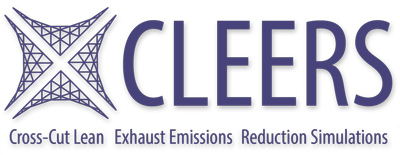
- This event has passed.
CLEERS Teleconference: Carl-Robert Florén, Chalmers University of Technology
2019-10-17 @ 11:00 - 12:00 EDT
Multiscale modelling total pressure effects on complete methane oxidation over alumina supported palladium.
C-R. Florén*, P-A. Carlsson, D. Creaser, H. Grönbeck and M. Skoglundh
Competence Centre for Catalysis, Chalmers University of Technology, Göteborg, 412 96 Sweden
*carl-robert.floren@chalmers.se
Introduction
Using natural gas for vehicle propulsion has recently regained interest where methane, which is the main component in both natural gas and biogas, benefits from a high H:C ratio. Further, combustion of natural gas produces cleaner exhaust gases with lower emissions of CO2, NOx, SOx and particulate matter, compared to diesel and gasoline upon combustion1. However, traces of uncombusted methane must be efficiently removed from the exhausts since methane is a potent greenhouse gas2. The methane abatement can be performed by total oxidation in a catalytic converter, where the methane traces are converted into less harmful carbon dioxide. Commonly, alumina supported palladium (Pd/Al2O3) is used to catalyse this reaction because of its high activity in lean (oxygen rich) conditions to activate the stable methane molecule3. The Pd/Al2O3 catalyst is, however, sensitive and shown to deactivate in the presence of water vapour as well as being negatively affected by carbon dioxide present in vehicle exhaust gases. To overcome the drawbacks, this study links atomistic understanding to catalyst performance meanwhile investigating whether an increased total pressure can enhance the catalyst efficiency. Here, a multiscale model for complete methane oxidation under lean conditions over a porous Pd/Al2O3 catalyst has been developed. The kinetics are based on first-principles calculations and used to investigate if the reaction rate for methane oxidation can be improved by increasing the total pressure.
Materials and Methods
The multiscale model is developed in the MATLAB software. A porous catalyst model of Pd/Al2O3 is used to account for mass and heat transport of reactants and products to and from the bulk gas into the porous catalyst. The surface reaction kinetics are based on transition state theory on PdO(101) and density functional theory is used to identify the reaction network. Internal and external mass, and heat transport are accounted for by correlations from chemical engineering where the effective diffusion is assumed to be dominated by bulk diffusion in the porous catalyst. The effects of total pressure on simulated methane conversion profiles, coverage of surface species and methane reaction orders are explored between 350-500 °C and total pressures of 1, 2 4 and 10 atm. The simulated exhaust gas used throughout the study contains 1000 ppm CH4, 10% O2, 10% H2O and 5% CO2.
Results and Discussion
The multiscale model reveals a delayed ignition but a higher conversion at elevated temperatures when the total pressure is increased from 1 to 10 atm (Figure 1). The simulations show a temperature and total pressure dependent operating point where the methane conversion is maximised. Analysis of the first-principles based kinetics reveals that the reaction is suppressed by adsorbed water, hydroxyl species and bicarbonates. All of which originate from adsorbed water and carbon dioxide in the gas phase. The reaction order for water and carbon dioxide on the complete methane oxidation reaction is -0.94 and -0.99, respectively and decreases with increasing total pressure.
Conclusions
The study paves the way towards flexible multiscale catalyst modelling where first-principles calculations are coupled to reactor modelling. The model predicts that an optimal operating point exists for the catalytic performance which is dependent on total pressure and temperature.
References
1. Gambino, M., Cericola, R., Corbo P., and Iannaccone, S., Journal of Engineering of Gas Turbines and Power 115 (1993) 747-749.
2. Lashof, D. A., and Ahuja, D. R., Nature 344 (1990) 529-531.
3. Gélin, P., and Primet, M., Applied Catalysis B: Environmental, 39 (2002) 1-37.


